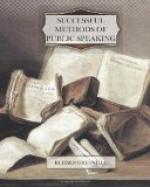“Them we know,—the high-souled, natural, unaffected, the citizen heroes. We know what happy firesides they left for the cheerless camp. We know with what pacific habits they dared the perils of the field. There is no mystery, no romance, no madness, under the name of chivalry about them. It is all resolute, manly resistance for conscience and liberty’s sake not merely of an overwhelming power, but of all the force of long-rooted habits and native love of order and peace.
“Above all, their blood calls to us from the soil which we tread; it beats in our veins; it cries to us not merely in the thrilling words of one of the first victims in this cause—’My sons, scorn to be slaves!’—but it cries with a still more moving eloquence—’My sons, forget not your fathers!’”
John Quincy Adams
John Quincy Adams, in his speech on “The Life and Character of Lafayette,” gives us a fine example of elevated and serious-minded utterance. The following extract from this speech can be studied with profit. Particularly note the use of sustained sentences, and the happy collocation of words. The concluding paragraph should be closely examined as a study in impressive climax.
“Pronounce him one of the first men of his age, and you have yet not done him justice. Try him by that test to which he sought in vain to stimulate the vulgar and selfish spirit of Napoleon; class him among the men who, to compare and seat themselves, must take in the compass of all ages; turn back your eyes upon the records of time; summon, from the creation of the world to this day, the mighty dead of every age and every clime,—and where, among the race of merely mortal men, shall one be found who, as the benefactor of his kind, shall claim to take precedence of Lafayette?
“There have doubtless been in all ages men whose discoveries or inventions in the world of matter, or of mind, have opened new avenues to the dominion of man over the material creation; have increased his means or his faculties of enjoyment; have raised him in nearer approximation to that higher and happier condition, the object of his hopes and aspirations in his present state of existence.
“Lafayette discovered no new principle of politics or of morals. He invented nothing in science. He disclosed no new phenomenon in the laws of nature. Born and educated in the highest order of feudal nobility, under the most absolute monarchy of Europe; in possession of an affluent fortune, and master of himself and of all his capabilities, at the moment of attaining manhood the principle of republican justice and of social equality took possession of his heart and mind, as if by inspiration from above.
“He devoted himself, his life, his fortune, his hereditary honors, his towering ambition, his splendid hopes, all to the cause of Liberty. He came to another hemisphere to defend her. He became one of the most effective champions of our independence; but, that once achieved, he returned to his own country, and thenceforward took no part in the controversies which have divided us.




